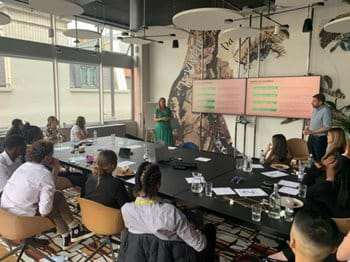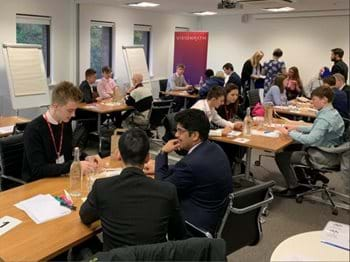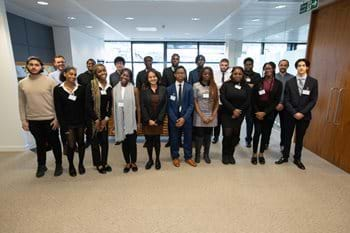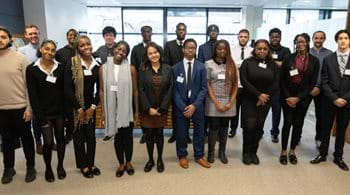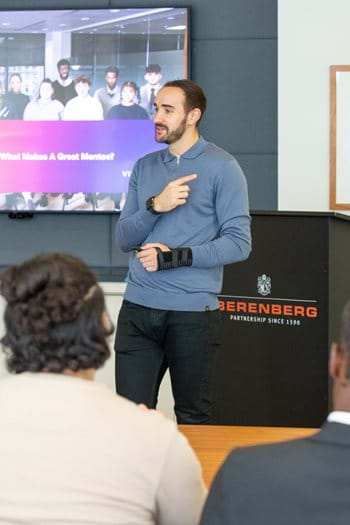The last couple of years have brought about a seismic shift in the world of work, not least for young people entering the workforce for the first time. As National Apprenticeship Week 2022 comes to a close, we've taken a look at the emerging trends employers taking on apprentices need to know.
1. School-leavers may have had limited opportunity for work experience
With much of retail and hospitality – along with many other industries – hit hard by extended closures and tightened budgets over the past couple of years, today's 18-year-olds may not all have CVs boasting part-time jobs like previous cohorts did.
Aside from limited availability of jobs, with social uncertainty and health anxiety at an all-time high, young people and their families have also had other factors to consider. Is a weekend job worth increasing risk of exposure to COVID-19? Is it better to use their spare time making up for the reduced opportunity to socialise at school? With a global pandemic in full swing and the future looking decidedly unclear, do they simply already have enough to think about?
Be aware that a lack of work experience from school leavers doesn't necessarily mean a lack of motivation. As we've so often heard, these are unprecedented times – and young people in their formative years are some of the hardest hit. As an employer, it's a chance for you to think differently about your future talent and show your compassion, flexibility and understanding.
Incorporate more time for screening in your selection process and keep it personal. Whether it's a phone call or a video chat, take the opportunity to talk to talent as early as possible. We've seen a rise in employers using video interview tools where they set on-screen questions and record candidates' answers. The verdict from most young people we've spoken to: it feels clinical and like they're a number, not a person. So keep it real, with an actual person!
Think also about the questions you ask. Use more attitude-based questions like "What's been the biggest challenge of the last 18 months and how have you overcome it?" Or, "Is there anything you've decided to do differently due to the pandemic - any new interests or passions?" Figuring out how someone has dealt with a situation where they haven't been about to find work can tell you a lot about their character, more than any part-time jobs on a CV could ever tell you.
2. Young people will ask about your 'work-from-office' policy
Forget about your work-from-home policy: young people are more interested in hearing about how often they can come into the office.
They've likely never been in a workplace before, and having been stuck at home for a large proportion of the past couple of years, they're keen to get out and socialise with their new teammates. Plus with their limited work experience (much of which is to be expected from entry-level candidates, even in normal times), they'll probably need a little more support and guidance than your average new starter.
Zoom is great for check-ins and catch-ups, but in person interactions can't be beaten for building relationships and confidence. Think of all the friendly chit-chat with your desk neighbour that helps you build relationships and collaborate better. Or the accidental conversations in the office kitchen that give you insight into the goings-on of the wider business. It's likely you're already considering this for your existing workforce, but for apprentices in their first job the importance can't be overstated.
The question is, how do you manage your wider team's work-from-home policy to accommodate your apprentices' work-from-office arrangements? There's not a lot of point in them coming into the office just to sit there alone. Direct managers and teammates especially should be around to offer face-time, so it's worth planning ahead and communicating expectations to both your existing workforce and new starters to make sure everyone is on the same page.
3. Students are under more pressure than ever
After two years of teacher-assessed grades, this year it's expected exams will return. But for students, unfortunately that doesn't mean it's back to the usual schedule.
Firstly, schools are increasingly focused on 'COVID catch-up' – making up for lost time with a stricter approach to attendance and trying to minimise distractions outside of school. On top of that, this year the Department of Education is requiring schools to introduce more mock exams to help with gathering evidence on students' learning, just in case we do end up back in lockdown.
The upshot is that, for employers looking to engage with schools and take on apprentice, this means students' bandwidths are even more stretched than usual. It's also harder to get students out of lessons, and there are more exam windows to avoid. So to get the best from candidates (and give them a fair opportunity to present their best selves), it's worth reviewing your application and assessment process – particularly with regards to timing so you're not impacting too much on school time. Can you hold assessments in school holidays, or after-hours?
This is where Visionpath can help. Working closely with schools and your business, we design and run inclusive, immersive assessment experiences that give disadvantaged school-leavers the ideal platform to showcase their skills, demonstrate their values and behaviour, and ultimately be the best version of themselves.
Want help reaching socially diverse school leavers with untapped potential? Check out how we can help you hire your next apprentices, or get in touch to find out more.


